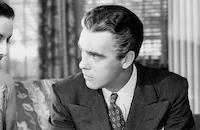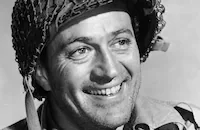Go for Broke!

Brief Synopsis
Cast & Crew
Robert Pirosh
Van Johnson
Lane Nakano
George Miki
Akira Fukunaga
Ken K. Okamoto
Film Details
Technical Specs

Synopsis
In 1943, Lieutenant Michael Grayson is dismayed when he finds that his first assignment as a lieutenant platoon leader is to be at Camp Shelby, Mississippi, home of the 442nd Regimental Combat Team, a new outfit composed entirely of Japanese-American volunteers. When he requests a transfer to the 36th Division, his old Texas National Guard unit, Col. Charles W. Pence refuses and dresses him down for using the word "Japs" when referring to the men who will be under his command. Capt. Solari, Grayson's superior officer, explains that the regimental slogan, "Go for Broke," is pidgin English for "shoot the works" and assures the suspicious lieutenant that none of the men are spies. In the barracks, Tommy Kamakura, an impetuous volunteer, and Sam, a soldier sending a package to his family in a relocation camp, discuss the main reason they have volunteered--to show that they are good Americans, so that "relocations" will not happen again. As the weks pass, Grayson puts the men through rigorous training and the unit becomes proficient. Tommy is anxious to fight in the Pacific, because his parents were killed in the attack on Pearl Harbor, but Sam tells him they will not be sent there because they might be mistaken for the enemy or thought to be spies. The men are shipped out on May 1, 1944, with Italy as their destination. After some time in Naples, the men of the "442" march through the countryside to Rome. At a village town, a woman flirts with Grayson, and while he romances her, the unit moves out. He interrupts the tryst when he learns that her recent " amico " was in the 36th Division, and excitedly leaves to try to find his former unit. Captain Solari, who has covered up for Grayson, reprimands him for his antagonistic attitude toward the Japanese-American soldiers. A short time later, Tommy and Sam are invited by two soldiers of the 100th Infantry Battalion, the other Army unit composed of Japanese Americans, for some wine they found in a vineyard. Their party is interrupted when the four are shot at by a German officer and one of the soldierss from the 110th is killed. Tommy, Sam and the other soldier, Masami, blow up the Germans with grenades, after which Tommy finds a baby pig, which he keeps as a pet. After Grayson reports the incident, he again asks Colonel Pence for a transfer to the 36th Division, and the disgusted colonel says he will try to arrange it. Solari, who has become friendly with Grayson despite his bigoted views, argues that many in the Army have parents who were born in enemy countries, such as Italian Americans, like himself, and German Americans. When Grayson says that the situation with the Japanese Americans is different, Solari challenges him to state the reason, asking if it is because of the shape of their eyes, or the color of their skin. Soon the men are moved to another theater of operation, and during their march, a battle ensues among Roman ruins. Tommy is wounded in the leg, but courageously fires a mortar on target, and the unit captures a German stronghold. The German officers taken prisoner are shocked to see Japanese-American troops, and Grayson is won over by his men's courage. After landing in Marseilles, Grayson, though now proud to be with the 442nd, is transferred to act as a liaison officer at the headquarters of the 36th Division, to which the 442nd outfit is now attached. Some time later, the soft-hearted Tommy sees the suffering and hunger of a poor French family and sadly gives them his pet pig for food for the children. Grayson finds some of the 442nd at a bar, where his old platoon sergeant, Wilson I. Culley, is making racist slurs. Unknown to the men of the 442nd, who think the two are buddies, Grayson fights Culley in an alley for calling him a "Jap-lover." Later, Grayson is sent with Culley's unit as an artillery observer, and the unit is surrounded by Germans. Some of the 442nd, when they are told they are being sent to help, are upset, knowing of the unit's racism, but Tommy says this will be their chance to teach the Texans. As they approach, the 442nd begin to fire on the Texans, thinking they are Germans, until Grayson yells a Japanese word he does not understand, but which he has often heard. Culley, grateful for their arrival, surprises the men fo the 442nd by revealing the nature of the fight he and Grayson earlier had, and Grayson learns that the Japanese word he used means, "you're a stupid jerk and a heel." The 442nd rescues the besieged Texans, and after winning the battle, the Japanese-American and Texan troops part amicably. The 442nd returns to America, where, in a ceremony on the White House lawn, President Harry S. Truman and General Mark W. Clark honor them, and they are cited for outstanding accomplishment in combat, and is honored with a parade down Pennsylvania Avenue.

Director
Robert Pirosh
Cast

Van Johnson
Lane Nakano
George Miki
Akira Fukunaga
Ken K. Okamoto
Henry Oyasato
Harry Hamada
Henry Nakamura

Warner Anderson

Don Haggerty
Gianna Canale
Dan Riss
George Tanaguchi
Frank Okada
Tommy T. Hirai
Ken Miwa
Tsutomu Paul Nakamura
Edward Earle
Freeman Lusk

Richard Anderson
Harris Matsushige
Leo Tatara
Shigeru Jerry Endo
Robert Otoi
Frank Iwanaga
Paul Togawa
Ray Tamaki
Somita Nagafuchi
Luis Aihara
Thomas Matsuura
Bo Sakaguchi
Kenneth Fujioshi
George Shimizu
Robert Ward Wood
Carmela Restivo
Ernesto Morelli
Frank Tarallo
George Waki
Henry Guttman
John Banner
Tak Kobayashi
Mario Siletti
Lucia Tarallo
Jeanne Lafayette
Ann Codee
Jack Reilly
Louis Mercier
Michele Lange
Rollin Moriyama
Paul Bannai
Tony Christian
Toru Iura

Walter Reed
James Hamaji
Hugh Beaumont
Harris Yokei
Frank Wilcox
Ned Roberts
William H. Yetter
Larry Winters
Albert D'arno
Robert Boon
Ted Ohira
Nori Sekino
Tennessee Jim
Joe Haworth
Mack Chandler
George Offerman Jr.
Eugene Gericke
Frank Francone
Anne Provincia
Richard Monda
Anthony La Morte
Ray Hyke

Roger Moore
Josette Deegan
Gladys Holland
Monique Chantal
Andre Guy
Robert Spencer
Jerry H. Fujikawa
Jack George
Therese Plauzoles
Rene Deloffre
Claude Guy
Pierre Plauzoles
George Nakashima
Dan Aredas
Tad Imoto
Crew
Lt. Col. Thomas W. Akins Inf.
David Bradley
Alberto Colombo
Alberto Colombo
Cedric Gibbons
A. Arnold Gillespie
Eddie Imazu
Mike Masaoka
James E. Newcom
Warren Newcombe
Frank Okada
Ken Okamoto
Robert Pirosh
Robert Pirosh
Dore Schary
Douglas Shearer
Al Shenberg
Alfred E. Spencer
Jerry Thorpe
William Tuttle
Paul C. Vogel
John A. Williams
Edwin B. Willis

Film Details
Technical Specs

Award Nominations
Best Writing, Screenplay
Articles
Go For Broke!
As stated in his autobiography Heyday, Schary had been desirous of a script dealing with the stateside detention centers to which Americans of Japanese ancestry had been interred for the duration of the hostilities. "To have rushed Japanese, who were American citizens, into those faraway areas--treeless, barren, lonely, surrounded by vistas of flat, scrubby plains--was unconscionable," Schary wrote. "The Nisei were not guilty of anything but became victims of terror and panic, losing their homes, farms, equipment and security."
After kicking it around with Robert Pirosh, the screenwriter who took home the Oscar® for Schary's Battle of the Bulge chronicle Battleground (1949), the producer decided to take a different tack with the issue. "The accent on the affirmative was the story of the 442nd Infantry Battalion, the Nisei combat unit that earned more medals and suffered more casualties than any other combat unit and proved more than any other factor the absurdity and shame of the internment camps."
Pirosh's script, which would land him another Academy Award nomination, focused on Michael Grayson (Van Johnson), an untested Army lieutenant whose anticipation for his first command evaporates when he learns that he'll be the topkick for the "Butterheads" of the 442nd. While initially not bothering to disguise his contempt for his new charges (played largely by actual veterans of the 442nd), Grayson's prejudices give way to grudging respect for their efforts in basic training, and he's ultimately humbled by the valor they display when sent off to combat in Italy. Bonded by their shared experience, Grayson and his unit must rise to the occasion when Grayson's old Texas battalion--the one he'd once hoped to lead--is pinned down by enemy fire in France.
Pirosh did a sterling job of directing his own scenario, and Johnson, for whom Battleground proved a stepping stone from juvenile roles to parts with more heft, also came through with another thoughtful effort. Go for Broke! ultimately met with strong reviews and receipts upon its release. "The picture was a success," Schary reminisced. "[A]s an ironic lagniappe, it was a roaring hit in Japan."
Producer: Dore Schary
Director: Robert Pirosh
Screenplay: Robert Pirosh
Cinematography: Paul Vogel
Film Editing: James E. Newcom
Art Direction: Cedric Gibbons, Eddie Imazu
Music: Alberto Colombo
Cast: Van Johnson (Lt. Michael Grayson), Lane Nakano (Sam), George Miki (Chick), Akira Fukunaga (Frank), Ken K. Okamoto (Kaz), Henry Oyasato (Ohara).
BW-91m. Closed captioning.
by Jay S. Steinberg

Go For Broke!
Quotes
Trivia
Notes
The film begins with a visual of a statement signed by Franklin D. Roosevelt: "The proposal of the War Department to organize a combat team consisting of loyal American citizens of Japanese descent has my full approval. The principle on which this country was founded and by which it has always been governed is that Americanism is a matter of the mind and heart. Americanism is not, and never was, a matter of race or ancestry." Following this, an introductory title card reads: "The 442nd Regimental Combat Team and the 100th Infantry Battalion were composed of American citizens of Japanese ancestry. BATTLE RECORD: 7 Major Campaigns in Europe; 9,486 Casualties; 18,143 Individual Decorations; 7 Presidential Unit Citations."
The 442nd, formed in 1943 and nicknamed the "Go for Broke" regiment, was comprised of Japanese American (Nisei) volunteer soldiers. Troops from the regiment were highly regarded for their bravery and had an extremely high casualty rate. As noted in historical sources, for its size and length of service, the 442nd was the most decorated unit in American history. The film recounts one of the unit's most famous actions, in which they rescued the 36th Infantry Division, called the "Texas" Division, when it was surrounded in the Vosges Mountains during the Battle of the Bulge.
In his autobiography, Dore Schary, M-G-M's chief of production, states that he suggested to Robert Pirosh, the Academy Award-winning writer and associate producer of M-G-M's acclaimed 1950 film about the Battle of the Bulge, Battleground, (see AFI Catalog of Feature Films, 1941-50) that they make a film about Japanese-American internment camps during World War II. While researching the camps, however, they decided instead to "latch onto a positive view of a negative fact," partly because of Cold War tensions, and make a film about the 442nd combat unit. New York Times, in a pre-production article, compared the planned film to recent Hollywood efforts to deal with bigotry: "Hollywood's current concern with the problem of racial and religious prejudice continues to lead movie-makers into new explorations of this apparently inexhaustible subject. Having investigated, in a succession of recent pictures, the plight of the Negro in a white society and dealt somewhat less fully with anti-Semitism and with alleged discrimination against Mexican-Americans in California, the screen now is about to speak in behalf of the Japanese-Americans, or Nisei."
According to news items in Los Angeles Daily News and New York Times, Pirosh had learned about the Japanese-American fighting units as he researched Battleground. When preparing Go for Broke!, Pirosh went to Hawaii to select five veterans of the 442nd unit to play leading roles in the film. According to Schary's autobiography, many of the stories included in the film were based on fact. David Bradley, recently hired by M-G-M as a fledgling director due to the interest in his 16mm student film Julius Caesar, was assigned to coach the non-actors in their performances. Mike Masaoka, the 442nd's first volunteer from the mainland, was hired as a consultant.
Hollywood Reporter news items include Tony Christian and Gay Gayle in the cast, but their appearance in the released film has not been confirmed. Other Hollywood Reporter news items note that the film received approval from Defense Dept. Maj. Gen. Floyd M. Parks, head of Army public information, who promised to fully promote the picture. The film had a special preview showing in Miami Beach, FL in mid-January 1951 and a special screening for President Harry S. Truman and his staff in mid-March 1951. The film's world premiere was held in the Kuhio Theatre in Honolulu, HI, followed by gala premieres in Los Angeles, Washington, D.C. and New York City.
Director of photography Paul C. Vogel also shot Battleground, in which Van Johnson had also starred. Some of the sequences in Go for Broke! were shot in the mountains in Idyllwild, California. Reviews generally praised the film. Variety commented, "The social angle is never overplayed and is effectively socked with a humorous touch." However, Hollywood Reporter noted: "Underlying the action are strong pleas for racial tolerance which come a bit too frequently. Actually the case of the Nisei soldier's suffering from prejudice need be stated but once because his acts of valor are here on film to win anybody to his side who can be won. Anything more has the effect of shaming the audience, a vast majority of whom only recently disliked and mistrusted all Japanese for four years." Robert Pirosh received an Academy Award nomination in the Writing (Story and Screenplay) category.















